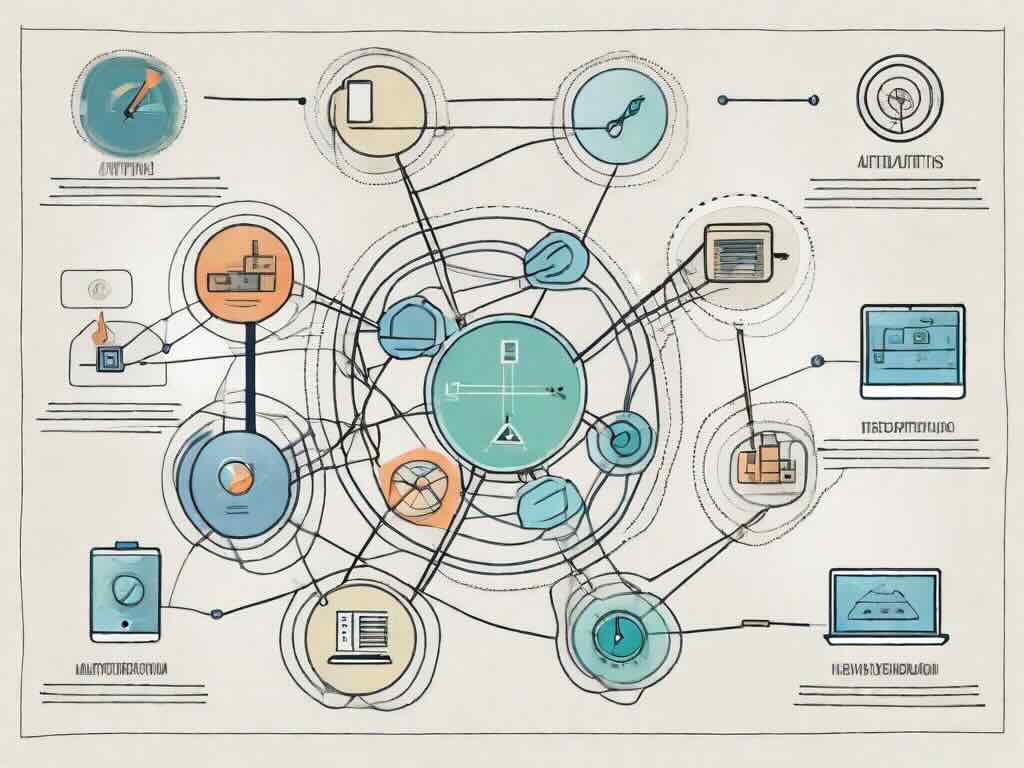
- Finding Time for Professional Growth
- Building a Toolkit of IT Audit Skills
- Combining Work and Learning: Tips for IT Auditors
- Harnessing Technology to Enhance IT Audit Skills
- Optimizing Your Workload to Prioritize Skill Development
- Utilizing Mentorship to Enhance Work Performance
- Crafting a Balance Between Work and Skill Development
- Making Time for Training in a Busy Schedule
- Leveraging Resources for Maximum Skill Development
- Allocating Time for IT Audit Professional Development
In the world of IT auditing, staying ahead of the curve is crucial. With rapidly evolving technologies and constant updates to regulatory requirements, it is essential for IT auditors to develop and enhance their skills continuously. However, finding the time to invest in professional growth can be challenging when faced with a demanding workload. This article will explore strategies and tips to help IT auditors balance their work responsibilities with skill development.
Finding Time for Professional Growth
Amidst the daily demands of an IT auditor’s job, it can be difficult to prioritize skill development. However, without continuous improvement, auditors risk falling behind and becoming less effective in their roles. To create time for professional growth, it is important to:
One effective strategy for finding time for professional growth is to identify and eliminate time-wasting activities and unnecessary distractions. As an IT auditor, it is crucial to evaluate your daily tasks and determine which activities are essential for your role. Streamlining your workflow and eliminating non-value-added tasks can free up more time to focus on skill development.
Another key step is communicating with your superiors about your commitment to skill development. By expressing your dedication to improving your abilities as an IT auditor, you can open up a dialogue with your managers and explore options for allocating dedicated time for training and development. This could involve negotiating specific hours or days each week that are solely dedicated to professional growth.
Furthermore, establishing a clear separation between work and personal time is essential for finding uninterrupted periods to focus on learning and development. As an IT auditor, bringing work home or constantly checking emails outside of office hours can be tempting. However, by setting boundaries and creating a strict division between work and personal life, you can ensure that you have dedicated time to invest in your professional growth.
Additionally, it can be beneficial to leverage technology and online resources to maximize your learning opportunities. With the increasing availability of online courses, webinars, and virtual conferences, you can access a wealth of educational content from your home. By taking advantage of these resources, you can further expand your knowledge and skills without compromising your work-life balance.
Moreover, networking with other professionals in the field can provide valuable insights and opportunities for growth. Engaging in industry events, joining professional associations, and participating in online forums can connect you with like-minded individuals who are also committed to continuous improvement. By sharing experiences and exchanging knowledge, you can enhance your skill set and stay up-to-date with the latest trends and best practices in IT auditing.
In conclusion, finding time for professional growth as an IT auditor requires proactive steps and a commitment to self-improvement. By identifying time-wasting activities, communicating with superiors, establishing work-life boundaries, leveraging technology, and networking with peers, you can create a conducive environment for skill development. Remember, investing in your professional growth is not only beneficial for your career but also for the organizations you serve as an IT auditor.
Building a Toolkit of IT Audit Skills
IT auditors must possess diverse skills to effectively navigate and assess today’s complex technological landscape. Building a toolkit of IT audit skills involves:
- Investing in ongoing professional certifications and training programs.
- Staying abreast of industry trends and developments through regular reading and research.
- Participating in webinars, conferences, and networking events to learn from industry experts and peers.
- Seeking opportunities to work on varied audit projects to gain exposure to different systems and technologies.
By continuously expanding your skillset, you can enhance your value as an IT auditor and contribute more effectively to your organization’s success.
Combining Work and Learning: Tips for IT Auditors
Integrating skill development into your daily work routine can help overcome the perceived conflict between work responsibilities and learning. By actively seeking opportunities to learn and grow within your role as an IT auditor, you can enhance your skills and stay ahead in a rapidly evolving industry. Consider implementing the following tips:
Schedule dedicated time for research and self-study during work hours. As an IT auditor, staying up to date with the latest industry trends and best practices is crucial. Setting aside a specific time each day or week for research and self-study lets you stay informed about emerging technologies, new regulations, and innovative audit methodologies. This dedicated time allows you to deepen your knowledge and apply it effectively in your work.
Identify projects or tasks that align with skills you want to develop and proactively seek opportunities to work on them. As an IT auditor, you have the unique advantage of being exposed to various aspects of technology and business processes. Take the initiative to identify projects or tasks that align with the skills you want to develop. Whether conducting a risk assessment for a new system implementation or participating in a cybersecurity audit, actively seeking out these opportunities will help you expand your skill set and demonstrate your commitment to professional growth.
Collaborate with colleagues and share knowledge and experiences to facilitate mutual skill development. The field of IT auditing is highly collaborative, and working closely with your colleagues can be a valuable learning experience. Engage in knowledge-sharing sessions, where you can discuss audit findings, share best practices, and learn from each other’s experiences. By fostering a culture of collaboration, you create an environment where everyone can benefit from each other’s expertise, ultimately enhancing the team’s collective skill set.
Explore automation tools and technologies that can streamline repetitive tasks, freeing up time for learning and growth. As an IT auditor, you often encounter repetitive tasks that can consume a significant amount of your time. Embracing automation tools and technologies can help streamline these tasks, allowing you to focus on more strategic and value-added activities. By leveraging automation, you increase your efficiency and create opportunities to invest time in learning new skills or exploring emerging areas within IT auditing.
Remember, combining work and learning is not just about acquiring new knowledge; it’s about applying that knowledge to enhance your performance as an IT auditor. By implementing these tips, you can create a harmonious balance between your work responsibilities and your professional development, ultimately positioning yourself as a well-rounded and highly skilled IT auditor.
Harnessing Technology to Enhance IT Audit Skills
The field of IT audit is intrinsically linked to technology. As an IT auditor, leveraging technology to enhance your skills can significantly improve your effectiveness and efficiency. Consider the following approaches:
- Explore audit management software and tools that can streamline audit processes, allowing you to focus more on analysis and interpretation.
- Utilize data analytics tools to quickly analyze large volumes of data and identify patterns or anomalies.
- Master data visualization techniques to effectively communicate audit findings and insights.
- Stay abreast of emerging technologies, such as artificial intelligence and blockchain, and their impact on IT auditing.
By embracing technology, IT auditors can stay ahead of the curve and provide value-added insights to their organizations.
Optimizing Your Workload to Prioritize Skill Development
Effective workload management is crucial for balancing work responsibilities and skill development. By strategically organizing your tasks and dedicating time to skill development activities, you can enhance your professional growth and achieve greater success in your career. Here are some strategies to consider:
- Regularly review your workload and assess priorities to identify tasks that can be delegated or postponed. This will help you create space in your schedule for skill development activities. It’s important to recognize that not all tasks are equally urgent or important, and by delegating or postponing certain tasks, you can free up valuable time to focus on developing your skills.
- Schedule designated time slots for skill development activities and treat them as non-negotiable commitments. Just like any other important meeting or appointment, it’s crucial to allocate specific time for skill development and stick to it. Treating these time slots as non-negotiable commitments, you prioritize your growth and ensure that you consistently invest in developing your skills.
- Use productivity techniques such as time blocking and the Pomodoro Technique to maintain focus and accomplish tasks efficiently. Time blocking involves dividing your day into specific blocks of time dedicated to different tasks or activities. By allocating specific blocks of time for skill development, you create a structured framework that helps you stay focused and make progress. On the other hand, the Pomodoro Technique involves working in short bursts of intense focus, followed by short breaks. This technique can help you maintain productivity and prevent burnout while working on skill development.
- Seek support from your team and superiors to ensure that workload distribution is fair and conducive to skill development. Communicate with your colleagues and superiors about your goals and the importance of skill development. You can create a supportive work environment that encourages skill growth by involving them in the process. Additionally, collaborating with others can lead to valuable learning opportunities and the sharing of knowledge and expertise.
Remember, optimizing your workload to prioritize skill development is an ongoing process. It requires continuous evaluation, adjustment, and commitment. By implementing these strategies, you can create a work-life balance that allows you to excel in your current role while also investing in your future success.
Utilizing Mentorship to Enhance Work Performance
Mentorship can be a powerful tool for IT auditors looking to enhance their work performance and develop new skills. Seeking guidance from experienced professionals can provide invaluable insights and accelerate your learning journey. To make the most of mentorship:
- Identify individuals within your organization or industry with the skills and knowledge you aspire to acquire.
- Approach potential mentors and express your interest in learning from their experiences.
- Establish clear objectives and expectations for the mentorship relationship.
- Regularly engage with your mentor through meetings, discussions, and feedback sessions.
By leveraging the wisdom and guidance of a mentor, you can fast-track your professional growth and development.
When identifying potential mentors, it is crucial to consider their expertise and experience in the specific areas you wish to develop. Look for individuals with a track record of success and a willingness to share their knowledge. This could be someone within your organization, such as a senior IT auditor or a manager with extensive experience in the field. Alternatively, you can explore mentorship opportunities outside your organization by reaching out to industry professionals through networking events, conferences, or online platforms.
Approaching potential mentors requires tact and professionalism. Start by researching their background and accomplishments to demonstrate your genuine interest in their expertise. Be clear about your intentions when reaching out and express how their guidance can help you achieve your professional goals. Remember to be respectful of their time and availability, as mentors are often busy professionals. It is essential to convey your commitment and willingness to invest the necessary effort to make the mentorship relationship mutually beneficial.
Setting clear objectives and expectations is crucial once you have established a mentorship relationship. Discuss with your mentor what specific skills or knowledge you aim to acquire and outline the desired outcomes of the mentorship. This will help both you and your mentor stay focused and aligned throughout the process. Regularly revisit and reassess these objectives to ensure that your mentorship journey remains on track and continues to meet your evolving needs.
Engagement is key to a successful mentorship relationship. Actively participate in meetings and discussions with your mentor, asking thoughtful questions and seeking their guidance on challenges you encounter. Be open to feedback and constructive criticism, as this is an opportunity for growth and improvement. Additionally, take advantage of any resources or learning materials your mentor may recommend, such as books, articles, or online courses. The more you invest in the mentorship process, the more you will benefit from the insights and experiences your mentor shares.
Remember that mentorship is a two-way street. While your mentor provides guidance and support, you also have a role to play in the relationship. Share your progress, successes, and challenges with your mentor, allowing them to celebrate your achievements and provide guidance when needed. Building a strong rapport and trust with your mentor is essential for a fruitful mentorship experience.
In conclusion, mentorship is a valuable resource for IT auditors seeking to enhance their work performance and develop new skills. By identifying suitable mentors, establishing clear objectives, and actively engaging in the mentorship process, you can accelerate your professional growth and achieve your goals more efficiently.
Crafting a Balance Between Work and Skill Development
Achieving a sustainable balance between work responsibilities and skill development requires conscious effort and planning. Consider the following strategies:
- Set realistic expectations for yourself and avoid overcommitting.
- Prioritize tasks based on importance and urgency to ensure that skill development activities are not neglected.
- Create a structured schedule that allows for dedicated time for work, skill development, and personal activities.
- Practice self-care and ensure that you allocate time for rest and relaxation to avoid burnout.
Making Time for Training in a Busy Schedule
Even in the busiest of schedules, carving out time for training and development is possible with careful planning and prioritization. Consider the following approaches:
- Utilize microlearning resources that can be consumed in bite-sized chunks, such as podcasts and online courses.
- Take advantage of downtime during commutes or breaks to engage in self-paced learning.
- Explore flexible training options, such as e-learning platforms, that allow you to learn at your own pace.
- Lock in dedicated learning time in your schedule and treat it as non-negotiable.
Leveraging Resources for Maximum Skill Development
IT auditors have access to a wealth of resources to aid in skill development. Consider the following resources:
- Online forums and communities where IT auditors share insights and experiences.
- Professional associations and organizations that offer educational resources and networking opportunities.
- Internal training programs and initiatives within your organization.
- Industry associations or employer organizations offer mentoring programs.
By leveraging these resources, you can maximize your skill development and tap into a broader network of professionals in the field.
Allocating Time for IT Audit Professional Development
IT audit professional development requires dedicated time and commitment. Look for opportunities to attend training sessions, conferences, and workshops that are tailored to IT auditors. Engage in continuous learning by participating in webinars or signing up for online courses specific to IT audit. Investing in your professional development will enhance your skills and position yourself for career advancement within the IT audit field.
As an IT auditor, balancing work responsibilities with skill development is a constant challenge. However, by prioritizing professional growth, leveraging technology, optimizing your workload, seeking mentorship, and utilizing available resources, you can strike a harmonious balance and excel in your role as an IT auditor.






